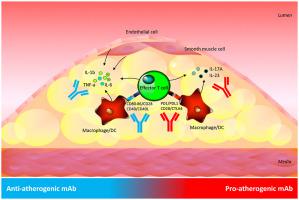Atherosclerosis ( IF 4.9 ) Pub Date : 2021-09-23 , DOI: 10.1016/j.atherosclerosis.2021.09.024 Esther Lutgens 1 , Jeremie Joffre 2 , Bram van Os 3 , Hafid Ait-Oufella 4

|
Over the past fifteen years, treatments using monoclonal antibodies specifically targeting cytokines have been developed to treat chronic inflammatory diseases, including rheumatoid arthritis or psoriasis, both associated with increased cardiovascular risk. The cardiovascular impact of these therapies allows us to validate the clinical relevance of the knowledge acquired from experimental studies about the role of cytokines in atherosclerosis. Several clinical studies have confirmed the protective effects of anti-TNFα and anti-IL-6R monoclonal antibodies against athero-thrombotic cardiovascular risk in patients with chronic inflammatory diseases. Yet, caution is needed since anti-TNFα treatment can aggravate chronic heart failure. More recently, the CANTOS study showed for the first time that an anti-inflammatory treatment using anti-IL-1β monoclonal antibody in coronary artery disease patients significantly reduced cardiovascular events. The effects of IL-23/IL-17 axis blockade on cardiovascular risk in patients with psoriasis or arthritis remain controversial. Several monoclonal antibodies targeting costimulatory molecules have also been developed, a direct way to confirm their involvement in atherothrombotic cardiovascular diseases. Blocking the CD28−CD80/86 axis with Abatacept has been shown to reduce cardiovascular risk. In contrast, the treatment of cancer patients with antibodies blocking immune checkpoint inhibitory receptors, such as CTLA-4, PD1, or PDL1, could worsen the risk of atherothrombotic events. In the future, cardiologists will be increasingly solicited to assess the cardiovascular risk of patients suffering from chronic inflammatory diseases or cancer and participate in choosing the most appropriate treatment. At the same time, immunomodulatory approaches directly targeting cardiovascular diseases will be developed as a complement to the usual treatment strategies.
中文翻译:

用单克隆抗体靶向动脉粥样硬化中的细胞因子和免疫检查点
在过去的 15 年里,已经开发出使用专门针对细胞因子的单克隆抗体来治疗慢性炎症性疾病,包括类风湿性关节炎或银屑病,这两种疾病都与心血管风险增加有关。这些疗法对心血管的影响使我们能够验证从有关细胞因子在动脉粥样硬化中的作用的实验研究中获得的知识的临床相关性。多项临床研究证实了抗-TNFα和抗-IL-6R单克隆抗体对慢性炎症性疾病患者动脉粥样硬化血栓形成心血管风险的保护作用。然而,需要谨慎,因为反-TNFα治疗可加重慢性心力衰竭。最近,CANTOS 研究首次表明,在冠状动脉疾病患者中使用抗IL -1β 单克隆抗体进行抗炎治疗可显着降低心血管事件。IL-23/IL-17 轴阻断对银屑病或关节炎患者心血管风险的影响仍存在争议。还开发了几种靶向共刺激分子的单克隆抗体,这是确认它们与动脉粥样硬化血栓形成心血管疾病有关的直接方法。阻止 CD28 -CD80/86 轴与阿巴西普已被证明可降低心血管风险。相比之下,用阻断免疫检查点抑制受体(如 CTLA-4、PD1 或 PDL1)的抗体治疗癌症患者可能会加重动脉粥样硬化血栓形成事件的风险。未来,将越来越多地邀请心脏病专家评估患有慢性炎症性疾病或癌症的患者的心血管风险,并参与选择最合适的治疗方法。同时,将开发直接针对心血管疾病的免疫调节方法,作为对常规治疗策略的补充。











































 京公网安备 11010802027423号
京公网安备 11010802027423号